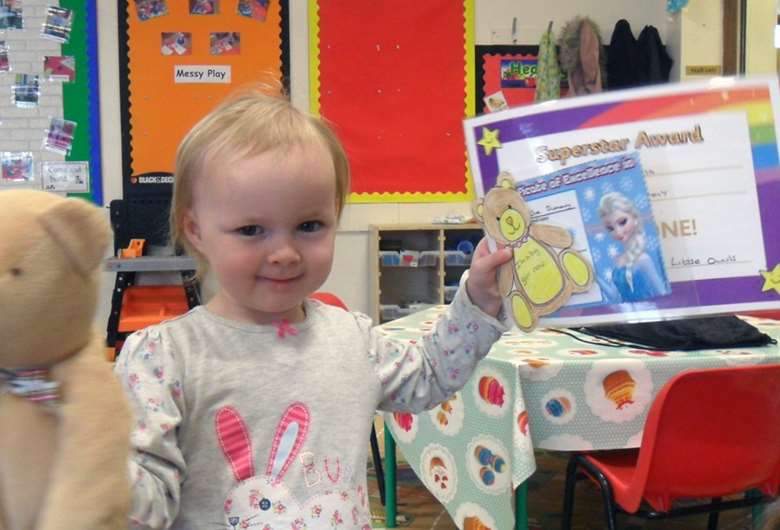Training scheme boosts speech skills
Monday, June 29, 2015
A national early language training programme has been successful in boosting the communication skills of two to three-year-olds.

The programme, run by children's communication charity I CAN and funded by the Department for Education (DfE), has increased awareness, knowledge and confidence among early years practitioners, with a knock-on effect on children's speech and language.
The aim of the Early Language Development Programme (ELDP) was to support language and communication skills in under-threes through a nationwide training programme. Originally funded by the DfE between 2011 and 2014, it was funded for another year due to the emerging evidence of the positive effects of the scheme.
An evaluation by researchers from the University of Sheffield and the Office for Public Management looked at the impact on practitioners, parents and children, and changes to practice in early years settings.
The first phase of the evaluation identified how far the programme was disseminated and whether it made a difference to practitioners. The findings of the second phase of the evaluation, which have just been released, focus on whether that difference made a positive impact on children's language.
It found that changes were evident in children's language eight weeks after staff had received the training.
The ELDP involved training 500 pairs of speech and language therapists and lead practitioners throughout England, who in turn trained 16,000 practitioners in a range of private, voluntary and independent (PVI) settings, school nurseries and children's centres. The project has also reached 150,000 parents and carers who received support as a result of the training.
The study involved 22 two-year-olds in four settings in North Lincolnshire and North Yorkshire, attending a mixture of children's centres and PVIs. The researchers used the standardised assessment of pre-school language scales to look at their understanding of language and use of expressive language.
The mean age of the children before the study was two years and eight months, and three years (36 months) after the study.
A standardised assessment was repeated twice on different occasions before practitioners went on the training, so that comparisons could be made to evaluate whether the training had an impact beyond children's typical rates of development.
Dr Judy Clegg, from the University of Sheffield's Department of Human Communication Sciences, who led the study, said, 'We were excited to see that children make statistically significant gains in language development when they are in a setting that enhances their abilities to communicate.'
After the training, children were found to use more words, put more words together to form early sentences, were more communicative, and had increased their vocabulary. They were also using longer phrases and could follow instructions. Three settings showed similar levels of improvement, while one showed less improvement. This could be attributed to issues with staffing, Dr Clegg suggested.
Changes in practice were sustained for nine or more months after the training. Nine in ten practitioners became more knowledgeable about children's early language development. In addition, the project had an impact on their observational and assessment skills.
The project also involved key workers assessing children's language development using an observational checklist. Dr Clegg said, 'Before their training, key workers would overestimate children's abilities, but afterwards they were more able to give an accurate assessment.'
Kate Freeman, I CAN lead adviser on the ELDP, said, 'Where it worked best was when there was a strategic approach from the local authority. For example, in Birmingham they wanted all PVI settings trained.'
She added, 'What we're really pleased to say is that there was a statistical difference in children's understanding and expression after the training. Following the training, practitioners were able to identify where children were having difficulties and do that on expected age norms to identify children with some delay.'
This enabled them to implement strategies, such as talking in shorter sentences, making sure they held the child's attention, and reducing distractions, such as noise levels.
'It's about understanding what is appropriate for really young children. If a child only understands one word out of a sentence, there is no point using nine or ten words. Flowery words make it harder for children to understand,' Ms Freeman added.
The training was also found to have an impact on parents, with 87 per cent reporting that they felt more confident about supporting their children's speech and language. One parent said, 'Since I have been shortening my sentences to match my child's, he is starting to communicate a lot more.'
- I CAN is continuing to offer the training through its licensee programme - email licensing@ican.org.uk or call 020 7843 2515. ELDP resources are available at www.icancharity.org.uk/resources/ new-getting-two-year-olds-talking
CASE STUDY: LITTLE OWLS NURSERY
Clare Grice, from Little Owls Nursery in Scunthorpe, attended the ELDP training with some of her colleagues, and is now the communication practitioner for the setting. Training was arranged by North Lincolnshire Council.
Ms Grice says it has 'really helped us with ideas for planning, next steps and activities', and particularly to support the children attending the nursery with English as an additional language.
The nursery now arranges visits to the library next door with parents and has found that families are using the library more.
'A lot of children still use their dummy at two and that hinders speech,' explains Ms Grice. 'We take the dummy away from children when they arrive in the morning and encourage the parents to dump the dummy and give them strategies to use at home, like only using it at nap time. We give the children a certificate if they get rid of the dummy altogether and they get to take "dummy bear" home with them.'




